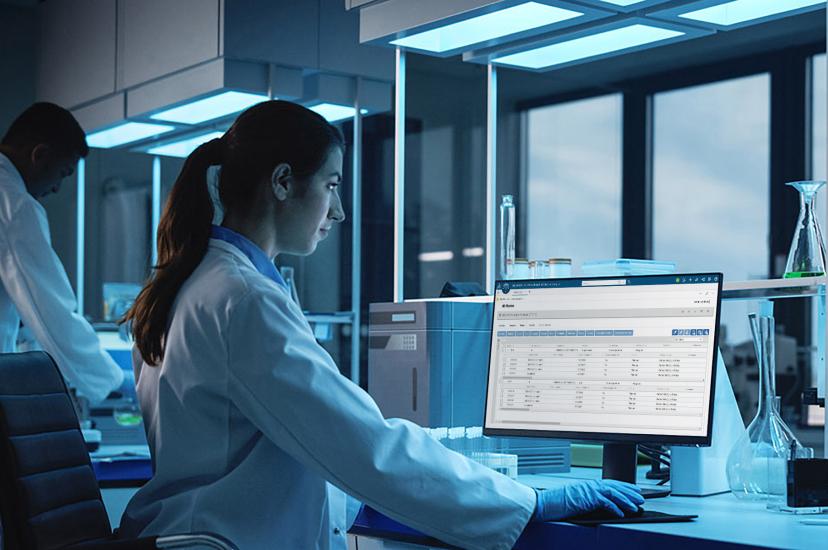Tech Focus: Automation and AI in lab software

Credit: YURIMA/Shutterstock
Automation and artificial intelligence (AI) are transforming laboratory operations, unlocking efficiencies, enhancing precision, and paving the way for groundbreaking discoveries. From diagnostics to drug development, the integration of cutting-edge software solutions is redefining how scientists and engineers design experiments, analyse data, and manage workflows.
To stay competitive, labs are adopting AI-powered platforms and automation tools that streamline complex tasks, increase throughput, and enable real-time decision-making. The rise of robotics, cloud computing, and machine learning (ML) algorithms in lab environments is revolutionising sectors such as biotechnology, pharmaceuticals, and materials science.
While the potential of AI and automation in labs is immense, challenges remain in ensuring data interoperability, managing costs, and addressing security concerns. Successful implementation depends on integrating these tools seamlessly with existing infrastructure and providing training for lab personnel.

BIOVIA ONE Lab
BIOVIA ONE Lab goes beyond traditional LIMS by offering a unified environment that digitalises all aspects of lab workflows, including instrument management, Procedure Execution, materials management, and method authoring. This eliminates data silos and streamlines workflows for scientists.
A key differentiator is BIOVIA ONE Lab's integrated procedure execution. Scientists can execute procedures directly within ONE Lab, ensuring adherence to protocols and reducing errors. Methods are authored according to industry standards. Additionally, instrument management is built-in, allowing for automated data acquisition, metrology functions, and the elimination of paper logbooks.
Another advantage is BIOVIA ONE Lab's comprehensive inventory management. Chemical inventory is integrated within the LIMS, providing real-time tracking of inventory levels, as well as safety compliance information.
BIOVIA ONE Lab offers the ability to integrate with other lab informatics systems through open APIs for ultimate deployment flexibility. ONE Lab stands out for its unified environment, integrated functionalities, and industry-standard approach, offering a comprehensive alternative to traditional LIMS.
SPONSORED BY

The future of lab automation and AI software is bright, promising faster discoveries, reduced costs, and enhanced precision. By leveraging these technologies, labs can focus on innovation while ensuring the reliability and reproducibility of their results.
Advanced lab software combines AI with robotics and sensor technologies to automate repetitive and high-throughput processes. Key capabilities include data integration, instrument connectivity, and simulation tools for designing experiments and interpreting results. Some leading-edge tools focus on applications like molecular modelling, predictive analytics, and workflow optimisation.
AI-Driven Tools for Experimentation and data management
LabTwin: A digital lab assistant powered by AI, LabTwin enables hands-free data recording through voice commands. It integrates with lab equipment and software, facilitating seamless data management and reducing manual errors.
Benchling: A cloud-based platform for life sciences, Benchling integrates experiment tracking, protocol management, and molecular biology tools into a single workspace. It leverages ML to analyse complex datasets and suggest improvements to experimental designs, offering features such as guided search and parameter optimisation.
DeepMind’s AlphaFold: AlphaFold uses AI to predict protein structures with unprecedented accuracy, aiding drug discovery and development.
Elsevier’s SciBite: Uses natural language processing (NLP) to extract and structure scientific data from literature, making it easier for researchers to connect findings and share insights.
AI-powered lab software accelerates data processing and provides insights from complex datasets, improving decision-making and research outcomes.
Thermo Fisher’s SampleManager LIMS: A laboratory information management system that integrates sample tracking, instrument data, and compliance management, enhanced with AI tools for predictive analytics.
PerkinElmer Signals: A platform for data visualisation and analysis that uses ML to identify trends, correlations, and anomalies in experimental data.
LabWare LIMS: A comprehensive platform offering sample and data management across industries. Its AI modules improve workflow automation and identify patterns in operational data to optimise lab efficiency.
STARLIMS by Abbott Informatics: A scalable LIMS platform that leverages AI for advanced analytics, integrating with Internet of Things (IoT) devices for real-time monitoring and data collection.
Cloudera Data Science Workbench: Helps researchers build, scale, and manage AI-driven analytics pipelines. Its integration with distributed computing platforms accelerates analysis of large scientific datasets.
DataRobot: Automates the development of machine learning models, providing actionable insights from structured and unstructured lab data. It supports predictive analytics for experimental planning and optimisation.
Waters UNIFI: A software suite that combines chromatography and mass spectrometry data with AI-driven tools for identifying chemical compounds and patterns in complex datasets.
Agilent MassHunter: provides AI-enhanced data processing software that enables faster analysis of mass spectrometry results, improving sensitivity in molecular detection.
Illumina DRAGEN Bio-IT Platform: Uses AI to accelerate genomic data analysis, including next-generation sequencing (NGS) pipelines. It offers high accuracy in variant calling and genome interpretation.
Parabricks by NVIDIA: Accelerates genomics analysis by integrating AI with GPU computing to reduce processing times for whole-genome and RNA-seq data.
CellProfiler: An open-source AI-enhanced software for analysing biological images. It uses machine learning to identify and quantify cellular features from microscopy images.
Aiforia: Provides AI to analyse medical and pathological images, enabling automated cell classification, tissue segmentation, and disease diagnosis.
Simulations Plus GastroPlus: Uses AI and predictive modelling to simulate drug absorption and interactions, aiding drug discovery and preclinical studies.
Schrodinger LiveDesign: Combines AI with molecular simulation tools to predict drug behaviour and guide early-stage pharmaceutical research.
Omics Data and AI Solutions
Qiagen CLC Genomics Workbench: Integrates AI to process omics datasets, enabling comprehensive analysis of transcriptomics, epigenomics, and proteomics data.
IBM Watson for Genomics: Uses natural language processing (NLP) and AI to interpret genomic data, helping researchers uncover clinically relevant biomarkers and mutations.

